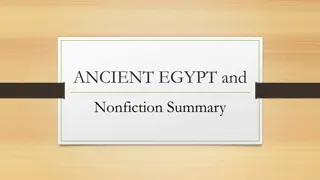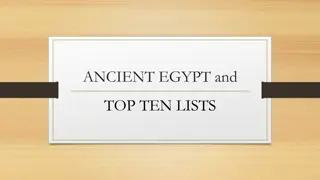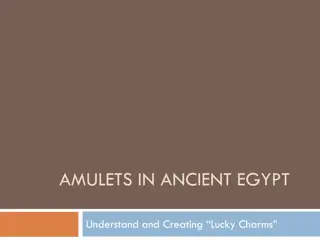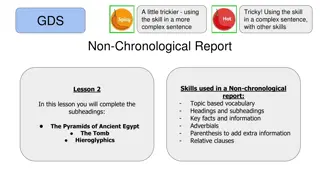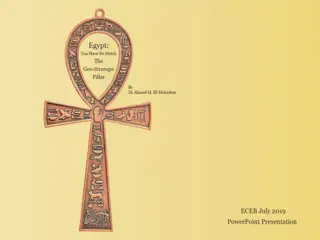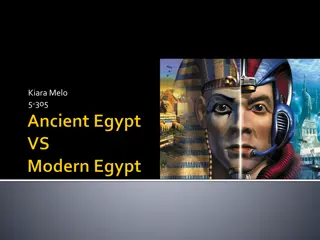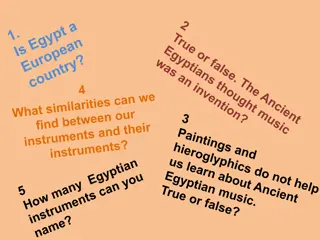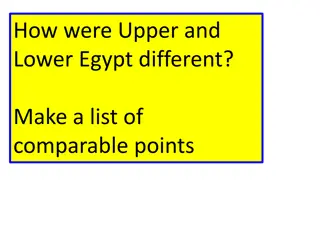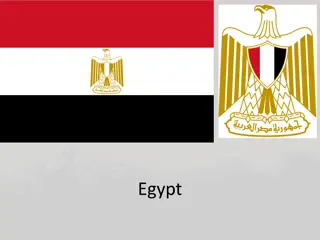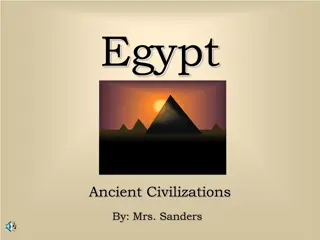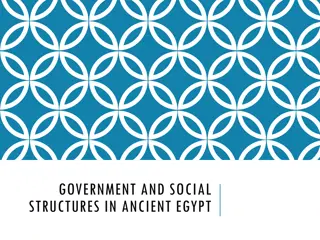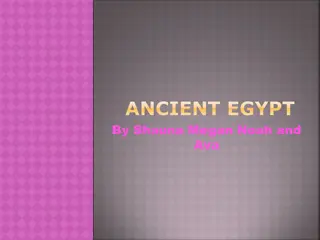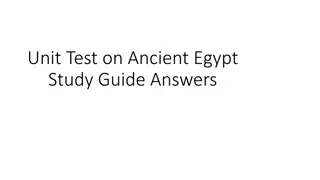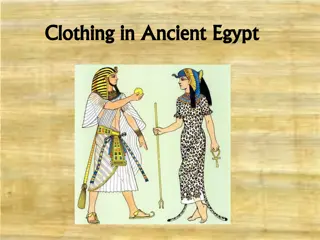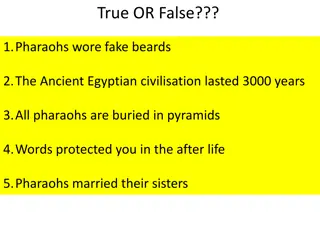Exploring Ancient Egypt: Chapter 3 - The Natural Environment, People, and Government
Valley of the Nile, agriculture, geographic isolation, the daily life of the majority peasants, the Pharaoh's divine rule, government under the Pharaoh, and the three kingdoms of Egypt are discussed in this chapter.
Download Presentation

Please find below an Image/Link to download the presentation.
The content on the website is provided AS IS for your information and personal use only. It may not be sold, licensed, or shared on other websites without obtaining consent from the author. Download presentation by click this link. If you encounter any issues during the download, it is possible that the publisher has removed the file from their server.
E N D
Presentation Transcript
Egypt Chapter 3 Notes
The Natural Environment Egypt Valley of the Nile 30 miles wide & 4,000 miles long Agriculture Nile was predictable Annual flood brought fertile soil Small reservoirs connect to intricate system of ditches thus irrigation system Geographic isolation Desserts: East and West Cataracts: prevented easy passage from the South Sea: Sea gave them some protection to the North
People Population majority peasants; free tenants farmers who worked on estate of large landowner or gov t. official Responsible for working in fields, care for irrigation works, tend to animals Little mechanization = labor intensive Peasants had an intimate relationship with natural environment Protection from strong gov t., regularity, and predictability was success of Egyptian civilization
People (Cont.) Daily life changed remarkably little in Egypt Slavery rare but increased during the Empire, when professional soldiers became necessary and prisoners of war became common Free tenant families eventually became serfs in later Egypt Small merchants and craftspeople lived in villages No real cities; gov t. controlled large-scale trade and commerce
The Pharaoh: Egypts God-King Capitals existed for kings and their officials to administer strong administrative control to assure stability Temples existed for pharaohs and priests enacted rituals prayers and sacrifices necessary to assure the favor of the gods who reigned over nature 3100-2500 BCE: foundation period and greatest triumphs and cultural achievement. Pharaoh was a god who choose to live on earth Pharaoh s will was law
Govt. under the Pharaoh Directly responsible for the welfare of Egypt Intermediate Periods (2200-2100 BCE) Pharaoh lost control over the governors of the southernmost provinces, Nomes. Invasion of the Hyksos Egypt had 3 female pharaohs Only place known to export grain surpluses Rarely touched by war
The 3 Kingdoms Dynasties: periods of monarchic rule by one family Old Kingdom (3100-2200 BCE) Narmer to the First Intermediate Period Most successful and fertile era Construction of the pyramids of Giza, Egypt s greatest monuments to the pharaohs Middle Kingdom (2100-1650 BCE) 500 years of political stability & con t. refinement of the arts and crafts Trade with neighbors becomes extensive Conditions of laboring poor gradually worsens Religion becomes democratic in terms of afterlife Small middle class of officials and merchants emerges
The 3 Kingdoms (cont.) New Kingdom (1550-700 BCE) Aka the Empire Only began after the defeat of the Hyksos Engaged in war with Hittites and others for control of Mesopotamia Marks Egypt s attempt to convert others to their ways but to no success Failed due to military reversals and internal discontent Last 300 years saw numerous invasions Persians conquest in 525 truly marks the end of Ancient Egypt.
Cultural Achievements Pyramids and stone temples of the Old Kingdom Tombs for the pharoah Fame of the empire Hieroglyphics sacred carvings 3000 BCE Rosetta Stone: 604 hieroglyphic symbols is now deciphered
Philosophy, Religion, Eternal life Polytheistic: many gods 3000 gods Amun-Ra: Sun God Anuket: Goddess of the Nile; fertility Osiris: Ruler of the afterlife Anubis: goddess of the underworld Ka: souls Horus: ruling pharaoh Ptah: origin; rebirth and renewal Satis: Goddess of the flood Maat: order; regularity & predictability
Philosophy, Religion, Eternal life Did not believe in reincarnation Heaven: Stately circle around the sun Hell: New Kingdom Priests were valued and could influence when king was unpopular Akhnaton & Nerfertiti: Monotheism: Aton
Trade & Egypts Influence Byblos & Phoenicia: timber Nubia: Ivory and gold & archers Land of Punt: spices: frankincense, myrrh, and gold Trade to the south of Egypt was the most valuable.
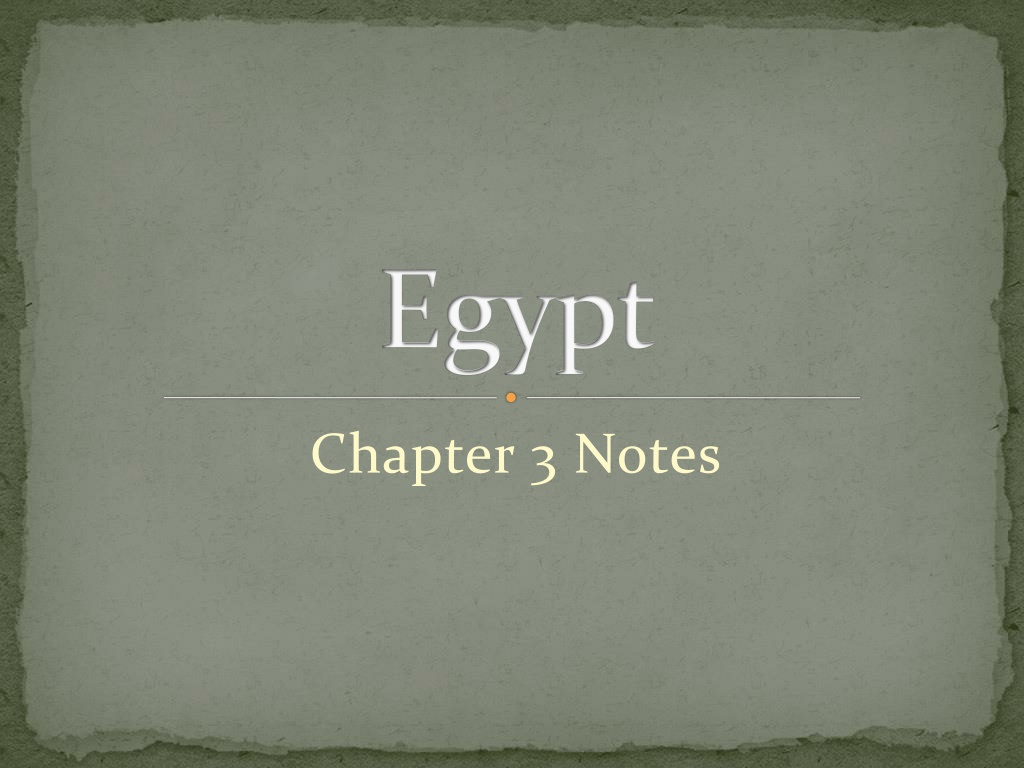

![[PDF⚡READ❤ONLINE] Tutankhamun's Trumpet: Ancient Egypt in 100 Objects from the](/thumb/20549/pdf-read-online-tutankhamun-s-trumpet-ancient-egypt-in-100-objects-from-the.jpg)
